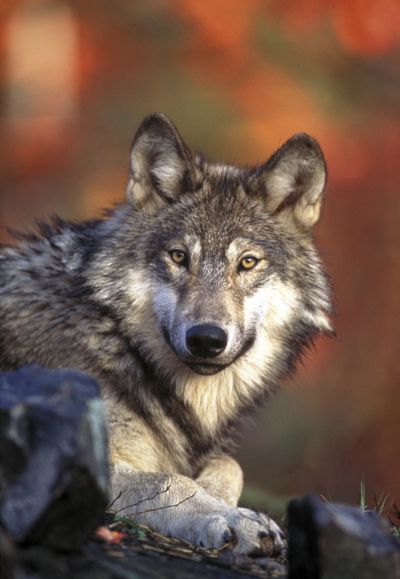State’s wolf plan meeting today
Fish and Wildlife panel to hear presentations

As Washington Fish and Wildlife officials are slashing budgets for existing programs, they’re meeting in Spokane today to deal with yet another new challenge – wolves.
The state Fish and Wildlife Commission will hear presentations on the proposed Wolf Conservation and Management Plan starting at 9 a.m. at the Ramada Spokane Airport, 8909 W. Airport Drive.
The gray wolf, considered an endangered species in Washington, is infiltrating from Idaho and Canada and has established at least five breeding packs since 2008.
Last week, Gov. Chris Gregoire announced that Fish and Wildlife Department officials would have to make another round of deep budget cuts.
Her suggestions included suspending compensation to farmers and ranchers for wildlife damage to their livestock and crops such as those caused by elk eating hay and bears shredding trees on private timberlands.
Compensation for livestock that are expected to be killed by wolves is a key issue in gaining the acceptance of farmers and ranchers for the wolf management plan, said Phil Anderson, Fish and Wildlife Department director.
“We have about $25,000 in hand for livestock depredation associated with wolves,” he said, noting the money came from the U.S. Fish and Wildlife Service and Defenders of Wildlife, an animal advocacy group.
No steady state funding source has been secured.
Anderson plans to pursue additional funds from the federal government and ask the Legislature to give the agency access to funds generated by sales of personalized vehicle license plates featuring the orca.
“Our agency has lost about 40 percent of our general fund money in the past three years, and we’re being asked to cut another 10 percent – that’s $6.9 million,” Anderson said.
The cuts likely will include more staff positions and the $300,000 the agency allocates every two years to compensating farmers and ranchers for wildlife damage to their crops, he said.
Meanwhile in Spokane, public comment on the proposed wolf management plan will be taken today during the Fish and Wildlife Commission’s afternoon session.
This is the last of four public meetings on the wolf plan, which has been two years in the making. The panel is scheduled to take final action on the plan in December.
The most controversial element of the plan hinges around the number of wolf packs that would be allowed before the state begins controlling the growth of the population.
The plan currently calls for 15 breeding pairs, but livestock and sportsmen’s groups are calling for wolf control to be triggered at a lower number of packs.
In 2004, when Montana had about 15 breeding wolf pairs, the state’s ranchers were paid $54,757 in wolf depredation compensation. Montana reported wolf management and monitoring costs exceeded $900,000 that year.